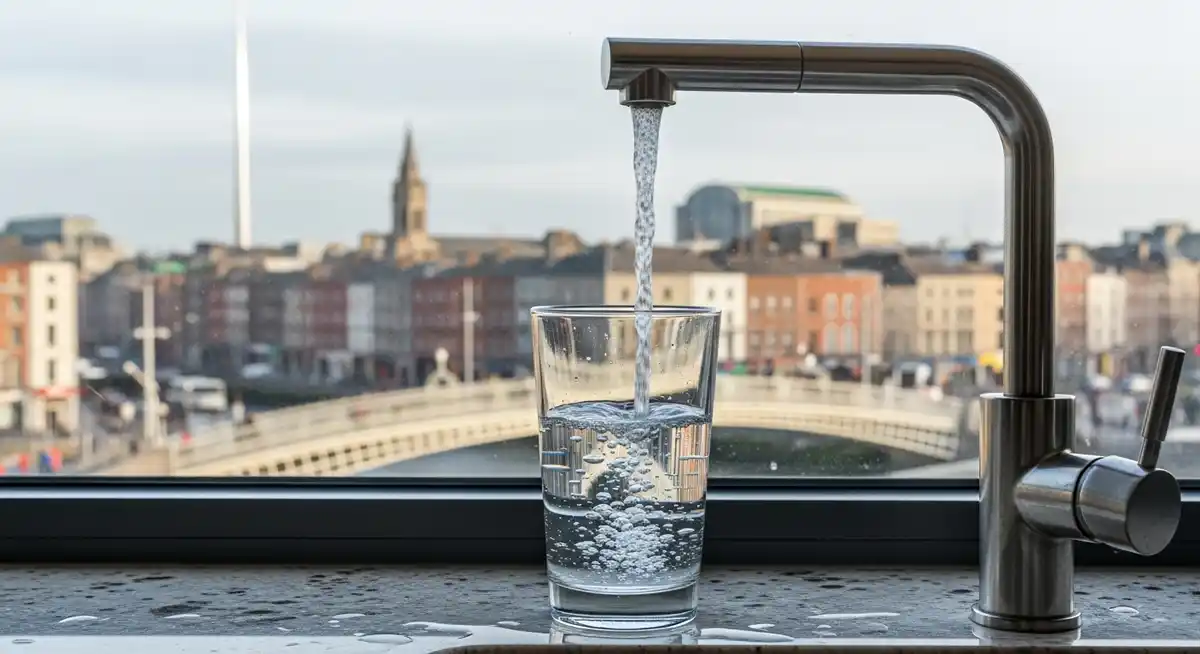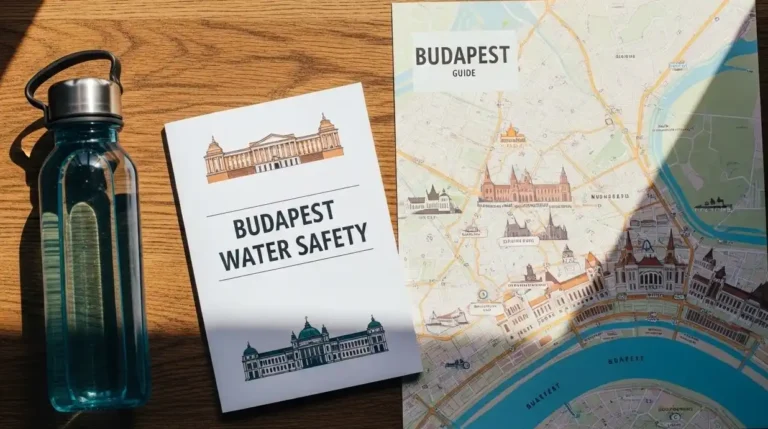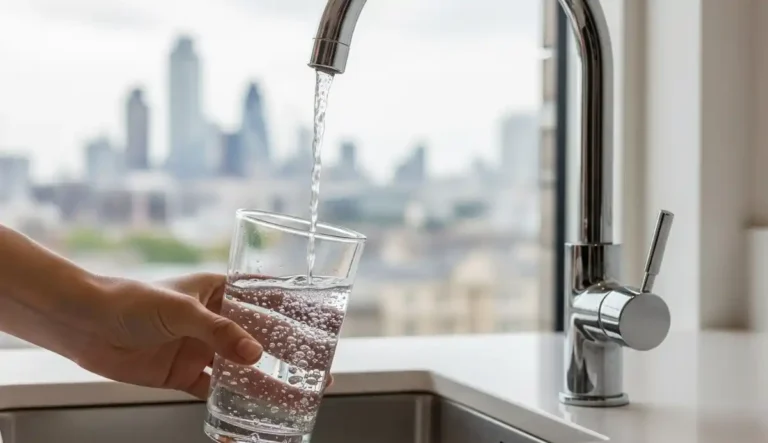Dublin Tap Water Exposed: What You Need to Know Before You Drink
Wondering if you can drink the tap water in Dublin? Here’s the truth: it’s not just safe — it’s some of the cleanest in Europe. Treated to the highest standards, packed with health-boosting minerals, and eco-friendly too, Dublin’s tap water is a clear win for both locals and travelers.
Whether you’re refilling your bottle in a park or sipping straight from your hotel sink, we’ll tell you exactly what to expect and how to make the most of this reliable, refreshing resource.
The tap water in Dublin meets Irish, EU, and international standards. It goes through a strict treatment process and is regularly monitored by the EPA to ensure the highest quality. Whether you are in pubs, restaurants, hotels, or visiting other cities like Cork, Galway, or Limerick, the water is safe to drink.
- Safe to Drink: Dublin tap water is clean, treated, and fully safe for locals and tourists alike.
- Strictly Regulated: Regular testing is conducted by Irish Water (Uisce Éireann) and the EPA to ensure a 99.7% compliance rate with EU standards.
- Reliable Water Sources: The main source is the River Liffey, treated at advanced plants like Ballymore Eustace and Leixlip using modern filtration and disinfection methods.
- Use Kitchen Tap: For the safest and freshest water, always use cold water from the kitchen tap, as it connects directly to the mains.
- Naturally Hard Water: Dublin’s moderately hard water contains healthy minerals like calcium and magnesium, beneficial for heart and dental health.
- Taste May Vary: Occasional slight chlorine or earthy taste is normal and harmless; optional filters can improve the flavor.
- Boil Notices Are Rare: Temporary boil water alerts may occur in specific zones but are handled quickly and effectively.
- Older Home Risks: Homes built before the 1970s may have lead pipes; testing and grants are available for safe replacement.
- Eco-Friendly Choice: Drinking tap water helps reduce plastic waste; refill stations are available across the city for reusable bottles.
- Portable Filters Optional: Though not necessary, filter bottles (like LifeStraw or Grayl) are useful for travel, outdoor use, or added peace of mind.
- Perfect for Daily Use: Tap water is safe for drinking, cooking, washing produce, brushing teeth, and making tea or coffee.
- Stay Informed Easily: You can check real-time water quality reports using your Eircode on Irish Water’s website or get updates on Beaches.ie.
Many people enjoy the hard water here, which can offer long-term benefits such as protection for cardiovascular health. You can also use it to wash fruits and vegetables, cook, or brush your teeth.
Bringing a reusable bottle to refill is a smart way to save money and reduce plastic waste while visiting. The River Liffey, a key water source, is treated with stringent treatments to keep it fresh and safe for everyone in Ireland.
Is Dublin Tap Water Safe to Drink?
Yes, Dublin tap water is safe to drink. It is treated to high EU standards, regularly tested, and suitable for both locals and tourists. For the safest option, always use the kitchen tap, as it’s directly connected to the main water supply.
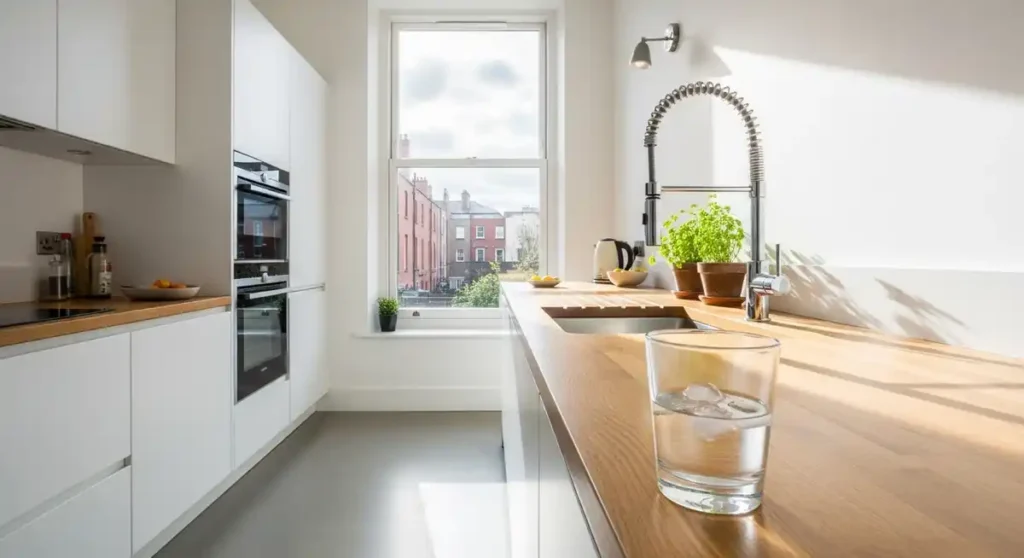
For Locals
Residents of Dublin enjoy access to safe, potable, and treated tap water that meets stringent EU standards. Managed by Uisce Éireann, the national utility, the water supply is subject to strict regulations and continuous testing.
Most households receive water directly from the mains, ensuring a high-quality source suitable for drinking, cooking, and daily use. The hard water common in Dublin can even offer health benefits, like protection against cardiovascular disease.
For Tourists & Foreigners
Visitors to Dublin can confidently drink the tap water without concern. Ireland, as an EU member, follows strict standards to maintain safety and quality. Many tourists and foreigners may notice a slight taste variation due to water consistency or hardness, but it remains entirely safe.
Bringing a reusable bottle and refilling it from the kitchen tap is both cost-effective and eco-friendly, helping reduce plastic waste while staying hydrated during your travelling in Europe.
Hotel Tap Water in Dublin
Hotel tap water in Dublin is part of the same public system and is treated to the same strict standards. It’s generally safe to drink, and many visitors rely on it daily. If desired, let the tap run briefly to clear out any sediment from pipes, especially in older buildings. The water’s taste may differ slightly but maintains full safety and potability.
Bathroom vs Kitchen Tap Water
The kitchen tap is your best choice for drinking water, as it’s connected directly to the main supply. On the other hand, bathroom taps in some households may be linked to a storage tank in the attic, which is not always recommended for drinking due to potential stagnation. While most systems are clean, choosing the cold kitchen tap ensures the freshest, tested, and most reliable source.
Dublin’s tap water remains one of the safest in Europe, meeting the high expectations of both locals and visitors.
Dublin’s Water Sources & Supply
Dublin’s water supply mainly comes from the River Liffey and is treated at advanced water-treatment plants like Ballymore Eustace and Leixlip. Irish Water ensures high-quality drinking water through modern treatment methods, leak reduction programs, and long-term infrastructure planning to support the Greater Dublin Area sustainably.
Main Sources
The primary source of drinking water for the Greater Dublin Area is the River Liffey, which supplies around 85% of the region’s needs. Supporting this are key water-treatment plants at Ballymore Eustace and Leixlip, both of which process raw water into treated water that is safe for use.
Other essential sources include plants located at Srowland (near Athy, Co Kildare), Bog of the Ring (near Balbriggan, on the Dublin-Meath border), and facilities at Ballyboden, Vartry in Roundwood, Monasterevin, and Rathangan. Reservoirs like Poulaphouca and Stillorgan also play a critical role in water storage and distribution.
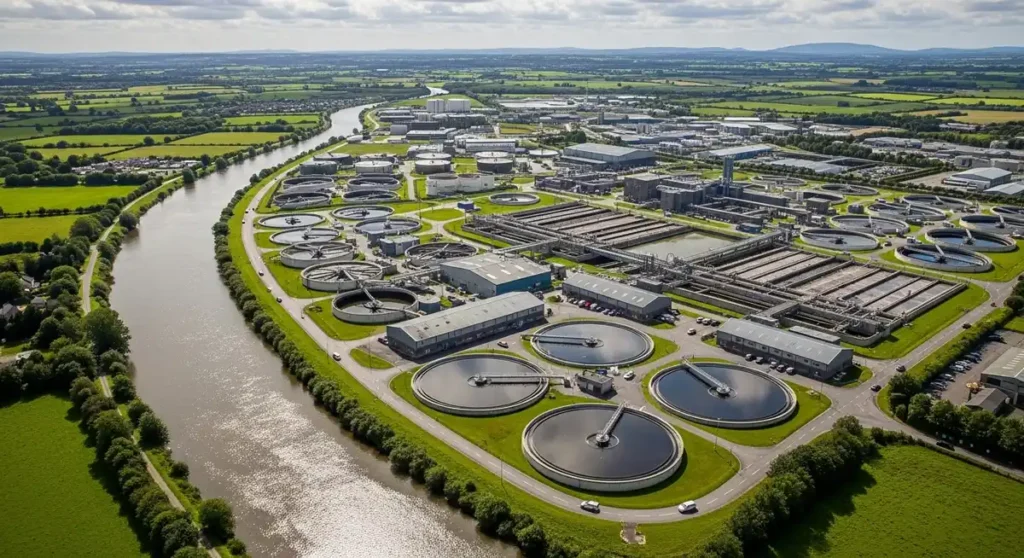
To ensure a stable supply for future generations, Irish Water has proposed the Water Supply Project Eastern and Midlands Region, which will bring treated water from the Parteen Basin on the River Shannon to Peamount in Dublin, with offtakes along key areas such as Tipperary, Offaly, and Westmeath.
How Water is Treated
Once sourced, the water undergoes several steps to ensure it meets safety standards. These include:
- Preliminary treatment to remove debris and suspended solids
- Filtration using sand and gravel
- Disinfection through chlorine, monochloramination, or UV treatment to eliminate bacteria and microorganisms
- pH adjustment using Polylime, and corrosion control with Polyphosphates
- Fluoridation to prevent tooth decay
This processed water is then sent through a well-connected distribution network to homes and businesses across the city.
Irish Water is also advancing its National Leakage Reduction Programme to reduce water leakage, improve flow, and support overall system resilience amid population growth, economic development, and climate change.
Regulation & Monitoring
Dublin’s water quality is rigorously regulated and monitored. Irish Water (Uisce Éireann), along with the Environmental Protection Agency (EPA) and Dublin City Council (DCC), perform daily monitoring and testing across all treatment plants and pipes.
The EPA ensures compliance with national and EU standards. The CRU (Commission for Regulation of Utilities) acts as the economic regulator, while real-time monitoring is conducted in areas like Dublin Port and Dublin Bay using advanced monitoring stations.
Bathing water quality is tracked during the bathing season (from June 1st to September 15th) at locations like Merrion Strand, where water is tested for E. coli, Intestinal Enterococci, and other indicators under the 2008 Bathing Water Quality Regulations.
Additional monitoring of rivers like the Camac, Dodder, and others is carried out through operational, surveillance, and investigative monitoring, ensuring water for both drinking use and recreational use remains safe and high-quality.
Understanding Dublin’s Water Quality
Dublin’s water quality is carefully monitored and meets high safety standards. Local authorities, in partnership with the EPA, ensure clean drinking water through regular testing, strong infrastructure, and effective treatment processes. The water contains natural minerals and is generally safe, with occasional variations in taste due to seasonal factors.
Dublin provides reliable and high-quality drinking water thanks to continuous monitoring, advanced treatment processes, and cooperation between local and national bodies. From rivers to reservoirs, every water source is assessed to ensure safety for homes and public use.
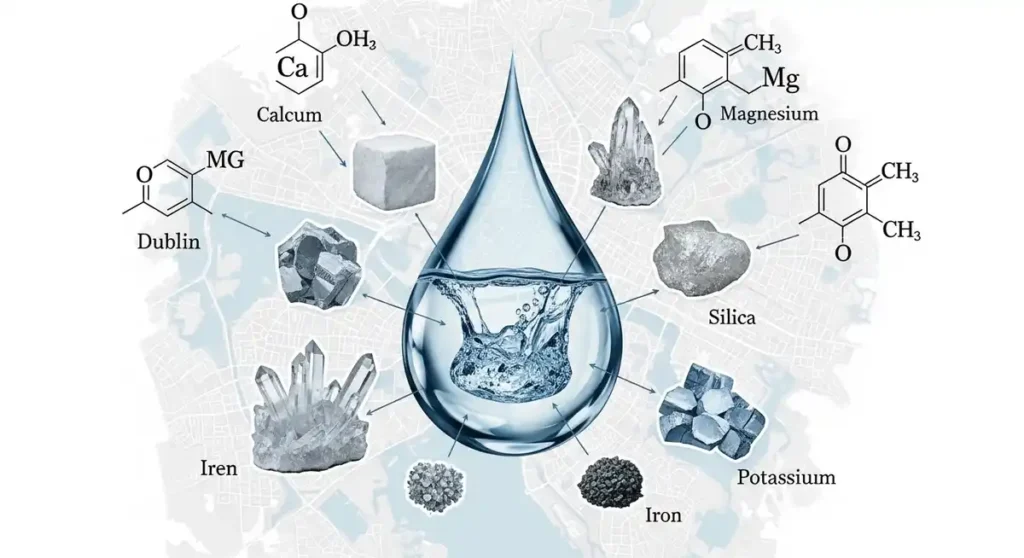
EPA Reports & Compliance
The Environmental Protection Agency (EPA) works closely with local authorities and Uisce Éireann, the national water utility, to oversee water quality management. Their focus is on maintaining compliance with drinking water standards, and they currently report a 99.7% compliance rate across Dublin.
Routine sampling, testing, and analysis of bacterial levels, pH, and other parameters help determine water safety in both drinking and bathing areas. Locations such as Dollymount Strand, Half Moon, and Sandymount Strand are continuously monitored and classified using the Bathing Water Quality Regulations to ensure excellent public access.
Mineral Content & Hardness
Dublin’s water is known to be moderately hard due to the region’s limestone geology, which adds beneficial minerals like calcium and magnesium. This mineral content supports overall health and is not considered a health risk.
The hardness of water ranges between 115–324 mg/L (or 7–19 gpg), measured in milligrams per liter. While it may lead to limescale in pipes or appliances, many households use water softeners to help maintain efficiency and extend the lifespan of fixtures and heating systems. These adjustments are simple and effective.
Taste & Smell Factors
In some areas, residents may notice a slight earthy or musty taste during certain times of the year. This is linked to low levels of Methylisoborneol (MIB), a natural substance produced during algal blooms in lakes and reservoirs.
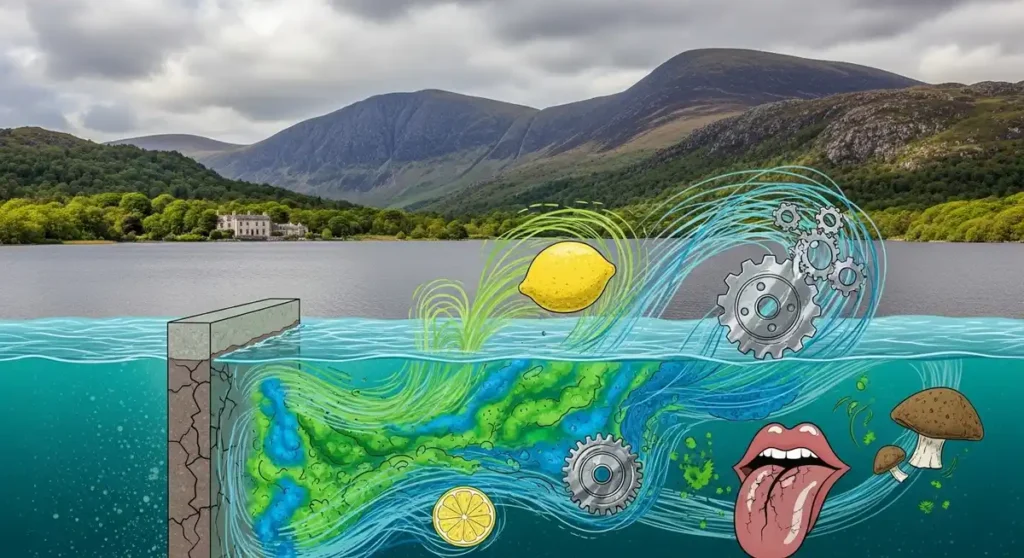
These changes are harmless and temporary, and the water remains safe to consume. Carbon filtration is a common solution used at home to reduce any odor or taste variations, helping enhance the overall drinking experience.
Smart Tools & Consumer Empowerment
Platforms like HomeWater offer detailed Water Quality Reports by simply entering your zip code. These reports provide clarity on contaminants, pollutants, and mineral levels present in your home water supply. This kind of knowledge helps residents stay informed and feel empowered to make confident water choices.
The city also supports citizen science programs and initiatives to track trends and share valuable data that further strengthens public confidence and environmental well-being.
Summary of Benefits
- High compliance with EPA standards
- Naturally occurring minerals beneficial for health
- Optional softeners improve efficiency in homes
- Safe and clean water, with mild seasonal variations in taste
- User-friendly tools for water quality checks
Dublin’s commitment to quality water management ensures a safe, healthy, and sustainable water supply for everyone.
Possible Concerns & Safety Notices
Dublin’s water is largely safe and meets high standards for drinking. While certain safety notices like boil water alerts may be issued in specific zones, they are temporary and managed carefully. Older homes may have lead pipes, but support is available for testing and replacement, ensuring continued quality and compliance across the supply network.
Water Problems in Older Homes
Many homes in Dublin City, especially those built before the mid-1970s, may still have lead pipes. These can be replaced through a grant program. Testing services are available for consumers who want to check their tap water. While lead might be present in older plumbing, temporary measures like letting the tap run before use can help reduce exposure.
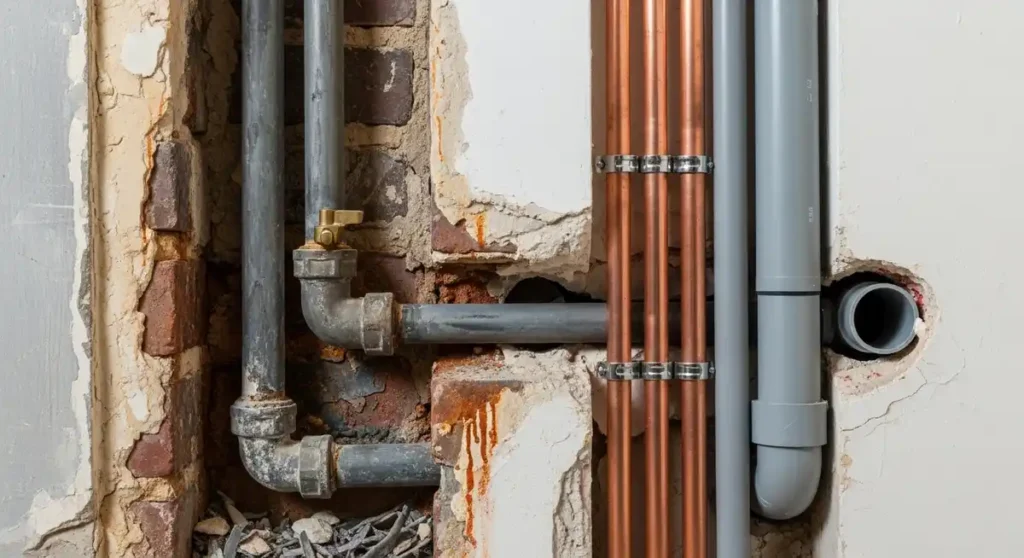
This ensures safe drinking water for infants, children, and pregnant women.
Notices, Risks, and Safety Actions
Uisce Éireann, the Irish water provider, sometimes gives notices for boil water in certain zones, like DLR Zone 2 or DCC Zone 6. These are rare and usually linked to bacteria being detected. The water is still safe when boiled and cooled before consumption. Such alerts are handled quickly and help keep consumers well-informed and safe.
Why Testing Matters
The EPA regularly checks water quality in private supplies, such as schools and nursing homes, ensuring compliance with chemical and bacterial standards. Occasionally, E. coli or THMs may be found due to natural organic matter reacting with chlorine. Filtration solutions, like those from EcoFilter, can further improve household water quality. Continued testing helps ensure the network meets all standards.
Weather Can Change Water Safety
After rainfall, stormwater runoff can affect waterways, leading to temporary changes like discolored water. However, the Council gives helpful advice, such as avoiding swimming or activities for 48 hours. Thanks to modern monitoring and smart planning, climate change and its effects on resources are well-managed, ensuring that Dublin’s water remains safe and dependable.
Using Dublin Tap Water in Daily Life
Dublin tap water is clean, safe, and treated to meet strict EU quality standards, making it perfectly suitable for daily use including drinking, cooking, washing produce, making tea or coffee, and brushing teeth. It is regularly monitored, and most homes have direct mains water access through kitchen taps.
For Drinking
Dublin tap water is fully treated, filtered, and disinfected to meet the highest safety standards. It is perfectly safe to drink straight from the kitchen tap and is widely consumed by both locals and visitors. The taste may vary slightly due to natural minerals or chlorine, but this doesn’t affect its safety or quality.
Cooking & Preparing Food
Tap water in Dublin is suitable for all cooking needs—from boiling pasta to preparing soups and rinsing ingredients. It meets EU drinking water standards, ensuring it’s clean and safe to use in your everyday meals.
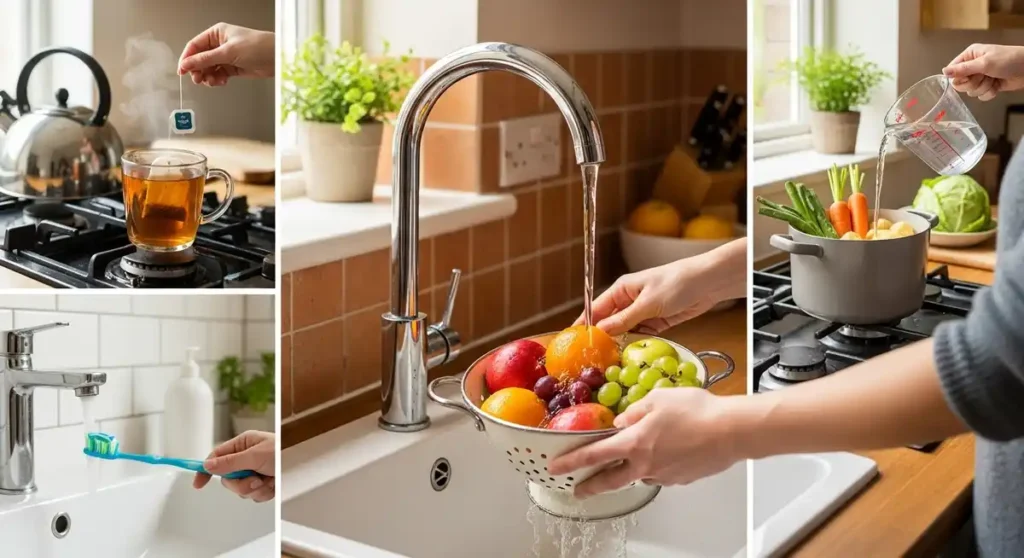
In the rare case of water advisories, authorities provide clear guidelines to follow.
Washing Fruits & Vegetables
You can confidently use Dublin tap water to wash fruits, vegetables, and other fresh produce. The water quality is consistently high and tested, making it effective in removing dirt and light residues. No need for bottled water or extra steps unless advised during official notices.
Making Tea & Coffee
Dublin tap water is excellent for making tea and coffee. Though the mineral content may slightly influence taste or cause mild limescale buildup, many locals and cafés use it daily. Boiling enhances the flavor and ensures the best brewing experience.
Brushing Teeth & Oral Hygiene
Public tap water in Dublin contains fluoride, which supports strong tooth enamel and helps prevent tooth decay. It is perfectly safe and beneficial for brushing teeth and general oral hygiene, making it a healthy and convenient part of your routine.
Ice & Cold Beverages
Using tap water to make ice or mix cold drinks is safe and convenient. The kitchen tap usually supplies water directly from the mains, ensuring freshness and quality. To enjoy the best taste, you can use a simple home filter, but it’s not a requirement for safety.
Comparing Tap Water vs Alternatives
In Dublin, tap water is a trusted and widely available resource. It comes from the River Liffey and is treated to meet strict EU and Irish standards. It’s regularly monitored for safety, and while it may carry a slight chlorine taste, it’s completely safe and affordable for daily use.
Many households enhance their water experience with filter-friendly solutions like Brita or EcoPro, which can improve the taste and remove minor impurities. Using tap water with a filter strikes a perfect balance between convenience, affordability, and environmental awareness.
Bottled Water in Dublin
Bottled water is easily found in supermarkets, convenience stores, and online platforms like Tesco.ie or Online.ie. Well-known brands such as Volvic, Evian, Ballygowan, Harrogate, and Ishka offer still, sparkling, and flavored options in various sizes, including multi-packs, boxes, and glass bottles.
Services like Spring Water Direct and HuntOffice.ie provide delivery options for offices and homes. Many people choose bottled water for its portability, variety, and taste preferences.
Filtered Water Options
Filtered water systems are popular in Dublin homes. Options range from pitcher-style filters to advanced under-sink and countertop systems. Brands like Culligan C100, EcoPro, and Brita use activated carbon and RO membranes to reduce taste-specific elements like chlorine, and enhance the overall flavor.
These systems are compact, easy to install, and can connect directly to the mains. Reverse osmosis (RO) units offer high-level filtration and are recommended for households with specific health or taste needs.
Refill Stations & Free Water Points
Dublin supports a growing network of refill locations. At places like Dublin Airport, parks, schools, community centres, and public buildings, you’ll find fountains or dispenser units marked by the Refill Ireland App.
These reusable water coolers and fountains promote a carbon-free, eco-friendly lifestyle.
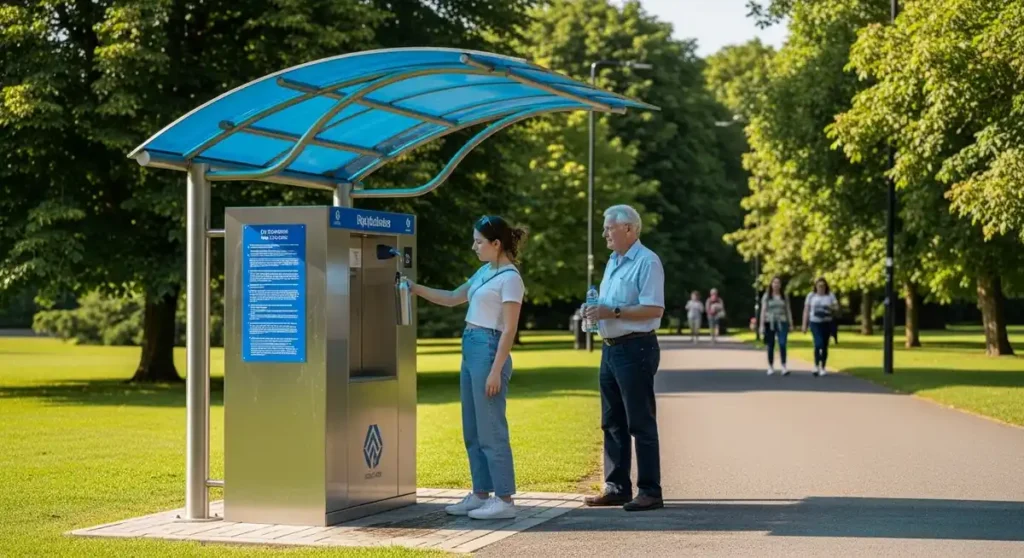
The Government.ie and Local.com initiatives support wider access through the LAPN, encouraging residents to refill instead of buying bottled water.
This not only supports affordability but also helps reduce plastic waste, making it a smart and environmental choice for families and professionals alike.
Health Benefits & Downsides
Dublin’s tap water is clean, safe, and meets strict EU standards. It’s cost-effective, environmentally friendly, and even offers health benefits due to its hard water content and added fluoride for dental protection.
Dublin’s tap water is one of the safest and most regulated in Europe. It goes through thorough treatment to remove pathogens, bacteria, and other contaminants. Because of its strict quality standards, it’s a trusted source of daily hydration for residents.
✅ Pros
- Safe & Reliable: The water is treated, filtered, and disinfected, ensuring safety and effectiveness for daily drinking.
- Cost-Effective: It’s a much cheaper option than bottled water.
- Environmental Benefits: Using tap water helps in avoiding plastic waste, which is better for the environment.
- Dental Protection: Fluoride is added to help protect dental health.
- Heart Health: Due to its hardness, the water may help in supporting cardiovascular condition over the long-term, as mentioned on indublin.ie.
- Convenience: The supply is readily accessible at home, making it a highly convenient choice.
- Neutral pH: The water maintains a neutral pH, which helps in preventing corrosion in pipes and keeps appliances in good condition.
- Low Iron Levels: This helps reduce staining and metallic tastes in fixtures.
☑️ Mild Considerations (Not Negatives)
- Chlorine Taste: Some might notice a slight taste due to chlorine, used to keep the water clean.
- Hard Water: While generally beneficial, it may leave minor scale in appliances. This is common and not harmful.
Dublin’s tap water is a safe, accessible, and environmentally friendly choice with clear health benefits. It’s a public resource that supports both personal health and sustainable living.
Staying Safe & Informed
Dublin’s tap water is safe to drink and meets Irish, EU, and international standards. It is rigorously treated, regularly tested by the EPA, and carefully monitored for quality. Residents and visitors can stay informed through official water quality reports and use optional portable filters for added convenience.
Dublin’s tap water is clean, fresh, and among the safest in Europe. It meets Irish, EU, and international standards, and the water treatment system ensures millions of liters are consumed daily without concern.
The Environmental Protection Agency (EPA) and Irish EPA carry out regular testing and monitoring to maintain excellent water quality. Sourced from the River Liffey, the water is treated with care and precision to ensure top safety and health outcomes.
How to Check Current Water Quality Reports
Staying informed is easy with tools provided by Irish Water (Uisce Éireann). You can visit their official website and enter your Eircode or address to view the latest reports for your water supply zone. You can also find bathing water quality updates on Beaches.ie, and explore more detailed insights via Irishriverproject.com, the EPA, and Citizens Information.
Recommended Portable Water Filter Bottles
While Dublin’s drinking water is very safe, many locals and travelers carry portable filter bottles for travel, outdoor use, or added peace of mind. Options like the Grayl GeoPress are known for their effectiveness, durability, and ability to purify water from many sources. Other great choices include:
- LifeStraw Go and Peak Series – great for removing parasites and bacteria
- Katadyn BeFree – lightweight with a fast flow rate
- Sawyer Squeeze and Mini – highly compact and easy to carry
- LARQ PureVis – features a self-cleaning UV-C LED and 2-stage filtration
You can find these at trusted outlets like Basecamp, Paddle and Pitch, The Canoe Centre, or online via REI. Other models like Platypus Quickdraw 3L, MSR, Aquaclear Water Filters, and Dropson Portable Water Filter Can are excellent for different budgets and capacity needs.
Emergency Preparedness
Although Boil Water Notices are rare, it’s smart to be prepared. Keep a filter, know how to flush taps after long inactivity, and understand basic steps for emergency water safety. Portable filters help during temporary disruptions or when exploring areas without guaranteed clean supply. Staying aware ensures water consumption remains safe and comfortable, no matter the situation.
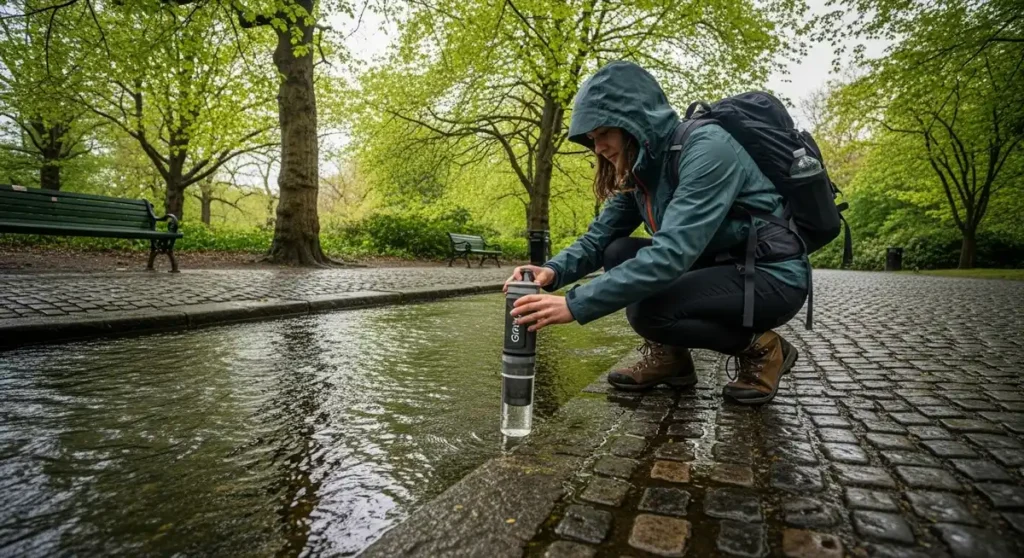
With the right tools and information, everyone can enjoy Dublin’s clean and reliable tap water confidently.
Conclusion
The tap water in Dublin is clean, fresh, and ready to drink. It comes from natural sources like the River Liffey and goes through a strict treatment process to make sure it’s safe. Thanks to stringent treatments and constant monitoring by the Irish EPA, the water in Dublin keeps up with global health standards.
Whether you’re staying in a hotel room, eating at local restaurants or pubs, or just exploring the city, you’ll find it easy to get a refreshing sip of tap water. Dublin’s water supply is trusted by both locals and foreign tourists. It’s safe across all of Ireland, including places like Galway and Cork.
For daily use—cooking, washing fruits and vegetables, or brushing your teeth—Dublin tap water is perfect. Carrying a reusable water bottle lets you refill at public refill points while also cutting down on plastic waste. It’s not just healthy; it’s one of the best in Europe, giving you peace of mind and a full bottle anytime.
FAQs – People Also Ask
Is it safe to drink tap water in Dublin?
Yes, it is safe to drink tap water in Dublin. The water is cleaned, tested often, and meets high safety rules from Ireland and the EU.
Can English people drink Irish tap water?
Yes, English people can drink Irish tap water. It is treated to high standards and is safe for everyone, including visitors.
Is Irish tap safe to drink?
Yes, Irish tap water is safe to drink. It goes through strong cleaning steps and regular tests to make sure it’s healthy and clean.
Can I drink water from a bathroom tap?
It’s better to drink from the kitchen tap. Bathroom taps may come from a tank, not the main pipe, so they are not always the best for drinking.
Is tap water in Dublin safe for Americans?
Yes, Dublin tap water is safe for Americans. It meets strong EU rules and is safe for tourists to drink and use every day.
Can I drink tap water in Dublin hotels?
Yes, you can drink tap water in Dublin hotels. It comes from the same clean public system as other places in the city.
Does Dublin tap water taste good?
Most people think Dublin tap water tastes fine. It may taste a bit different because of minerals, but it’s still safe and clean.
Is Dublin water hard or soft?
Dublin has hard water. That means it has minerals like calcium and magnesium, which are good for your health.
Where can I refill my water bottle for free in Dublin?
You can refill your bottle for free at airports, parks, schools, and other public places. Look for water stations or use the Refill Ireland app.
Can you use Dublin tap water for baby formula?
Yes, you can use Dublin tap water for baby formula. Just boil it first to make sure it’s extra safe for babies.
Does Dublin tap water contain fluoride?
Yes, Dublin’s tap water has fluoride. It helps keep teeth strong and prevents tooth decay.
What should I do if I get sick after drinking tap water?
If you feel sick after drinking tap water, talk to a doctor. You can also check for local water updates or boil the water just to be safe.
Disclaimer
This article is for informational purposes only. While every effort is made to ensure accuracy, please consult official sources for updates. For more travel tips, visit traveldrizzle.com.
